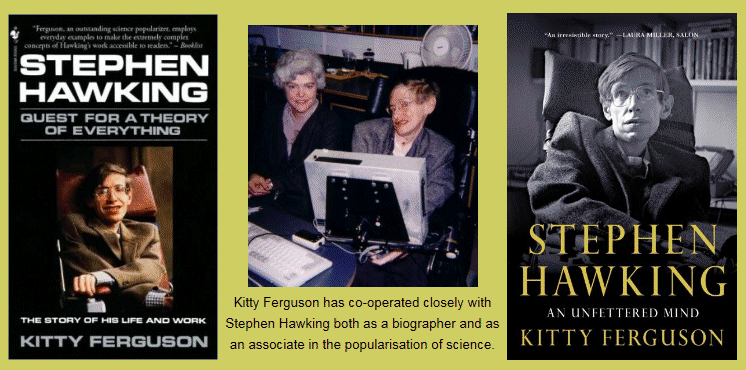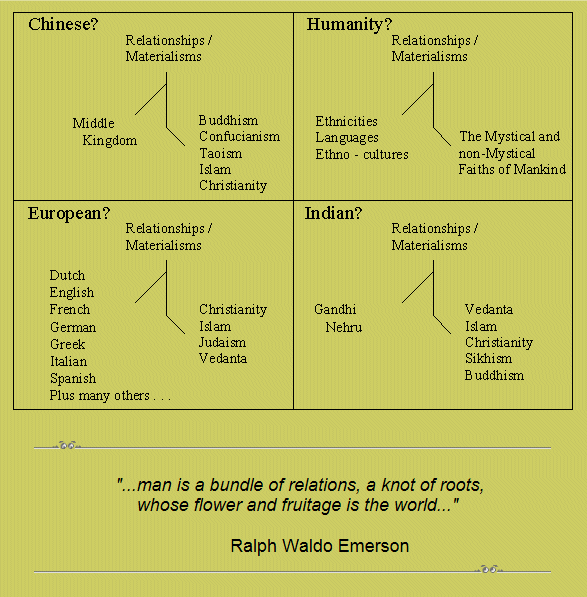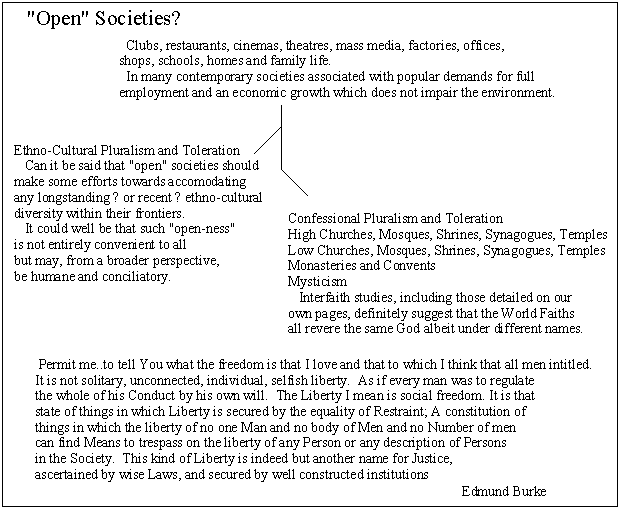The Theory of Everything
Professor Stephen Hawkings quotations quotes

At the time of the publication of Stephen Hawking's most famous 'popular' work ~ A Brief History of Time ~ (in 1988), the Ferguson family were living in the USA and Kitty Ferguson attempted to make plain some of the concepts related in that work to her eight-year-old daughter who had been tasked with a project about Black Holes in her school.
"and I realised that I could explain this stuff to her, and I found it was such fun to try to find ways to explain it."It happened that Mr. Ferguson's career led the family to become resident in Cambridge, UK in 1989 where this young girl attended the same school as Stephen Hawking's daughter both of which circumstances emboldened Kitty Ferguson to approach Stephen Hawking for his input towards the completion of a book she was preparing on Black Holes for young people.
Kitty Ferguson
Whilst her publisher had tended to insist on a rather dry presentation of the subject Stephen Hawking's influence, and the example he had himself set in his own ~ A Brief History of Time ~ resulted in some injection of humour into the intended work.
As an outcome of this initial collaboration Stephen Hawking responded positively to Kitty Ferguson's suggestion that she prepare his biography providing her with never-before-published photos and other material about his childhood and life.
The resulting book, Stephen Hawking: Quest for a Theory of Everything, went on to become a Sunday Times bestseller when it was published in 1991.
Given their close collaboration it may be presumed that Stephen Hawking gave approval and consent to the book's title.
Kitty Ferguson's more recent work ~ Stephen Hawking: His Life and Work ~ being an expanded biography of Prof. Hawking.
Both of these biographical works make some mention of Stephen Hawking's being associated with the search for a Theory of Everything.
Chapter One of His Life and Work being entitled "The Quest for a Theory of Everything" and, in relation to a lecture delivered in 1980 by a student associate, on behalf of the even then somewhat communicatively limited Stephen Hawking at the time of appointment to the famous Lucasian Professorship of Mathematics at Cambridge University, included this passage:-
The title announced for his lecture was a question 'Is the End in Sight for Theoretical Physics?' Hawking startled his listeners by announcing that he thought it was. He invited them to join him in a sensational escape through time and space on a quest to find the Holy Grail of science: the theory that explains the universe and everything that happens in it - what some were calling the Theory of Everything.and later made this observation:-
It was typical of Hawking's iconoclasm to begin this distinguished professorship by predicting the end of his own field. He said he thought there was a good chance the so-called Theory of Everything would be found before the close of the twentieth century, leaving little for theoretical physicists like himself to do.It has happened, however, that Prof Hawking has found cause to revise the timescaling of his estimates.
In 1998 referring to his Inaugural Speech as Lucasian Professor, and in the context of expectations about key discoveries and proofs being forthcoming courtesy of the operation of the Large Hadron Collider in Switzerland, he said:-
In 1980 I said I thought there was a 50-50 chance of us finding a complete unified theory in the next twenty years. That is still my estimate, but the twenty years begins now. I will be back in another twenty years to tell you if we made it.Further, and indefinite, delays in finding the Holy Grail of science being recognised in Hawking and Mlodinow's ~ The Grand Design ~ in 2010.
![]()
We are ourselves at least as interested in finding explanations for what Human Beings do with those aspects of physical reality that they can lay claim to!!!
Some Human Mysteries
"You will hear things like, "Science doesn't know everything." Well, of course science doesn't know everything. But,
because science doesn't know everything, it doesn't mean that science knows nothing. Science knows enough for us to
be watched by a few million people now on television, for these lights to be working, for quite extraordinary
miracles to have taken place in terms of the harnessing of the physical world and our dim approaches towards
understanding it. And as Wittgenstein quite rightly said, "When we understand every single secret of the universe,
there will still be left the eternal mystery of the human heart."
Stephen Fry quoting Wittgenstein during a Room 101 TV program
Stephen Fry quoting Wittgenstein during a Room 101 TV program
Human Being seems
to be rather "Tripartite"
It is widely known that Plato, pupil of and close friend to Socrates, accepted that Human
Beings have a " Tripartite Soul " where the individual Human Psyche is composed of three aspects -
Wisdom-Rationality, Spirited-Will and Appetite-Desire.
What is less widely appreciated is that such major World Faiths as Christianity, Islam, Hinduism, Buddhism and Sikhism see "Spirituality" as being relative to "Desire" and to "Wrath".

"bundles of relations and knots of roots"
tend to contribute towards giving rise to the "World" of Human Societies!!!

Although this may well depend on such things as:-
How "socio-politically doctrinaire" an individual society might be.
(Societies committed to Marxist ideology, for example, may not be particularly "Tripartite").
Key insights are available here at Age-of-the-Sage,
(from the Great Faiths, Plato, Socrates, Pythagoras, Shakespeare and Emerson!!!),
that give convincing support to such a depiction of Human Nature!!!
Believe it or not even SCIENCE seems to agree with such a view!!!
"Whatever concept one may hold, from a metaphysical point of view, concerning the freedom of the will, certainly its appearances,
which are human actions, like every other natural event, are determined by universal laws. However obscure their causes, history,
which is concerned with narrating these appearances, permits us to hope that if we attend to the play of freedom of the human will
in the large, we may be able to discern a regular movement in it, and that what seems complex and chaotic in the single individual
may be seen from the standpoint of the human race as a whole to be a steady and progressive though slow evolution of its original endowment."
Immanuel Kant
Idea for a Universal History from a Cosmopolitan Point of View (1784)
Immanuel Kant
Idea for a Universal History from a Cosmopolitan Point of View (1784)
Or to quote Emerson, from his famous Essay ~ History more fully:-
"In old Rome the public roads beginning at the Forum proceeded north, south, east, west, to the centre of every province of the empire, making each market-town of Persia, Spain, and Britain pervious to the soldiers of the capital: so out of the human heart go, as it were, highways to the heart of every object in nature, to reduce it under the dominion of man. A man is a bundle of relations, a knot of roots, whose flower and fruitage is the world. His faculties refer to natures out of him, and predict the world he is to inhabit, as the fins of the fish foreshow that water exists, or the wings of an eagle in the egg presuppose air. He cannot live without a world."
"In old Rome the public roads beginning at the Forum proceeded north, south, east, west, to the centre of every province of the empire, making each market-town of Persia, Spain, and Britain pervious to the soldiers of the capital: so out of the human heart go, as it were, highways to the heart of every object in nature, to reduce it under the dominion of man. A man is a bundle of relations, a knot of roots, whose flower and fruitage is the world. His faculties refer to natures out of him, and predict the world he is to inhabit, as the fins of the fish foreshow that water exists, or the wings of an eagle in the egg presuppose air. He cannot live without a world."

"There is one mind common to all individual men....
....Of the works of this mind history is the record. Man is explicable by nothing less than all his history. All the facts of history pre-exist as laws. Each law in turn is made by circumstances predominant. The creation of a thousand forests is in one acorn, and Egypt, Greece, Rome, Gaul, Britain, America, lie folded already in the first man. Epoch after epoch, camp, kingdom, empire, republic, democracy, are merely the application of this manifold spirit to the manifold world."
From Ralph Waldo Emerson's Essay ~ History
....Of the works of this mind history is the record. Man is explicable by nothing less than all his history. All the facts of history pre-exist as laws. Each law in turn is made by circumstances predominant. The creation of a thousand forests is in one acorn, and Egypt, Greece, Rome, Gaul, Britain, America, lie folded already in the first man. Epoch after epoch, camp, kingdom, empire, republic, democracy, are merely the application of this manifold spirit to the manifold world."
From Ralph Waldo Emerson's Essay ~ History

"Mankind are so much the same, in all times and places, that history informs us of nothing new or strange in this particular. Its chief use is only to discover the constant
and universal principles of human nature."
David Hume
Does all of this psychological and philosophical insight demonstate that Hawking and Mlodinow's assertion that
~ philosophy is dead ~ rather overstates the case?
David Hume

Mention has been made of such undoubtedly celebrated philosophers, within the Western tradition, as Plato and Kant.
This sort of a "Metaphysical & Tripartite" approach to Existence has, however, been long identified by Eastern philosophy:-

The eminent Indian holy man Vivekananda, (actually a name-in-religion suggestive of "the bliss of discerning wisdom"), lived between 1863-1902.
He personally made a massively favorable impression upon the World Congress of Religions held in Chicago in 1893 and is credited with being a key figure in the broader introduction of Indian philosophy to the Western world.
According to Vivekananda :-
Religion deals with the truths of the metaphysical world just as chemistry and the other natural sciences deal with the truths of the physical world. The book one
must read to learn chemistry is the book of nature. The book from which to learn religion is your own mind and heart. The sage is often ignorant of physical science,
because he reads the wrong book - the book within; and the scientist is too often ignorant of religion, because he too reads the wrong book - the book without.
More details on such Eastern philosophic approaches are available via this link:-
More details on such Eastern philosophic approaches are available via this link:-
